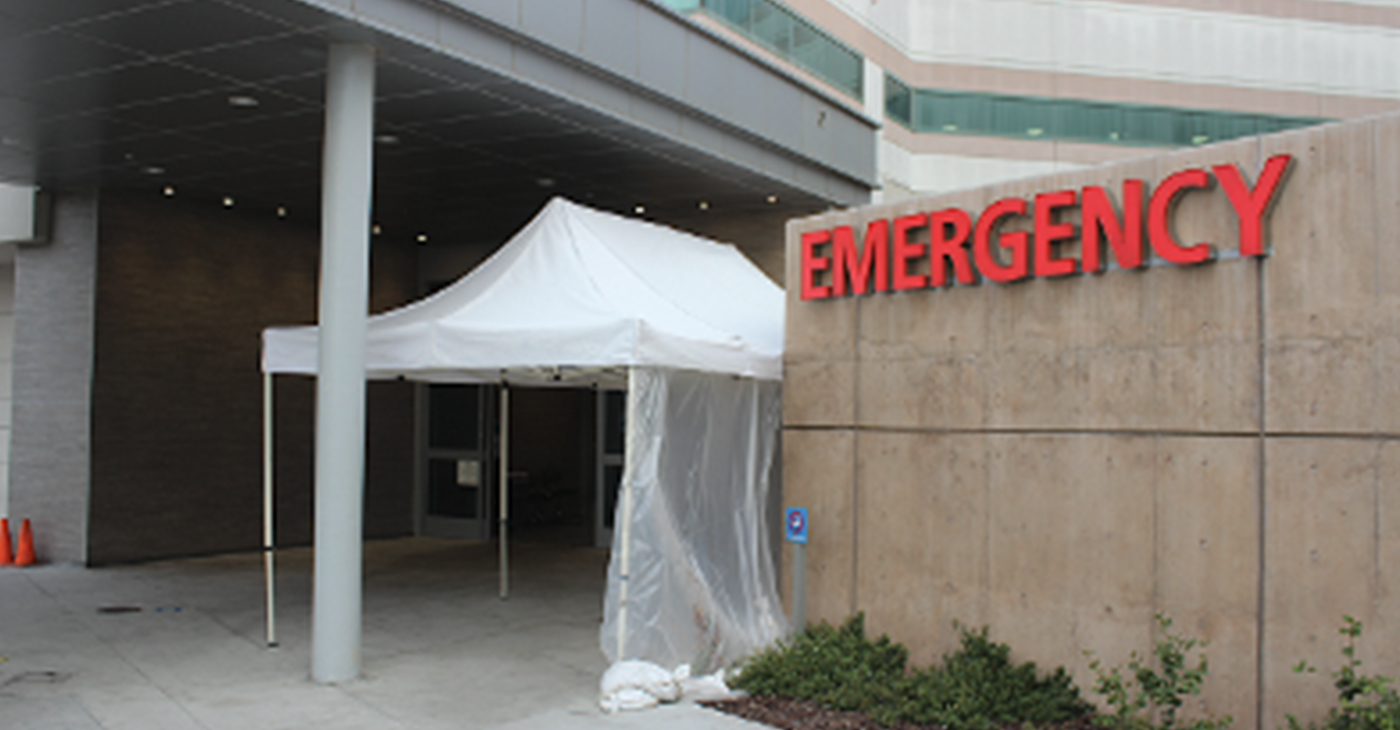Bay Area
Oakland Healthcare Unions Denounce CDC and California’s New Guidelines
While federal and California state guidelines now allow healthcare workers who test positive for COVID-19 to return to work without quarantining as long as they are asymptomatic until at least February 1, it’s unclear what this will mean for several Oakland healthcare facilities.

By Zack Haber
Two unions representing healthcare professionals have denounced recent moves by the Center for Disease Control (CDC) and The California Department of Public Health that have eased, or in some cases temporarily eliminated, quarantining guidelines for those who have tested positive for COVID-19 or been directly exposed to the virus.
“Part of why there’s this rise in transmission is that people aren’t quite well and they’re able to come out and mingle with the public,” said Zenei Triunfo-Cortez in an interview. Triunfo-Cortez has worked as a registered nurse for 42 years, and she’s the president of National Nurses United (NNU), a registered nurses’ union with over 175,000 members.
On December 22 of last year, as news that the CDC was considering shortening their COVID-19 quarantine duration guidelines from 10 days to five days was spreading, the NNU published an open letter to the director of the CDC, Dr. Rochelle Walensky, that urged her to maintain the 10-day quarantine period.
“Weakening COVID-19 guidance now, in the face of what could be the most devastating COVID-19 surge yet,” the letter reads, “will only result in further transmission, illness and death.”
On December 23, the CDC changed their guidelines for healthcare workers. To address staffing shortages, the new guidelines stated that medical facilities could have both vaccinated and unvaccinated healthcare workers who test positive for the virus return to their jobs immediately without quarantining in certain crisis situations as long as they were either asymptomatic or mildly symptomatic.
On December 27, the CDC changed their guidelines for the rest of the population, shortening the quarantining period from 10 to five days. The new guidelines stated that as long as a COVID-positive person has no symptoms or their symptoms are resolving and they don’t have a fever, they can end their quarantine on the sixth day.
“The change is motivated by science demonstrating that the majority of [COVID-19] transmission occurs early in the course of the illness,” reads a statement from the CDC about the reduced quarantine guideline, “generally in the 1-2 days prior to onset of symptoms and 2-3 days after.”
In their letter, the NNU pointed to the extremely contagious Omicron variant, and warned “Now is not the time to relax protections.” They mentioned pressure from businesses to maintain profits “without regard for science or the health of employees or the public” as the primary motivation for shortening the quarantine time. The letter included a link to a story about Delta Airlines CEO Ed Bastian asking the CDC to consider such a change.
Data from Alameda County, and California show that after the Omicron variant of COVID-19 began to become widespread in mid-December, local and statewide cases surged. By late December, average daily case rates were higher than they ever had been before.
Hospitalizations also rose sharply. Then cases and hospitalizations continued to rise through early January and have continued to rise. At the time of publication, information on recent COVID-19 deaths is unclear as the county and the state are updating that data.
“It’s stressful because some of our co-workers might be coming into work sick,” said Sonya Allen-Smith in an interview on January 7 about working under the new guidelines. She’s been an X-ray technologist at a Kaiser Permanente facility in Oakland for 13 years and is a member of the SEIU UHW union for healthcare workers.
“We think about if we’re going to take it home to our families,” she said. “My husband’s immune system is compromised. If I bring it home to him, he definitely will not make it.”
The Oakland Post obtained a flow chart Kaiser e-mailed to their employees on January 7 that guided them through the quarantine process the company required them to enter into if they tested positive for COVID-19.
It showed Kaiser employees had to quarantine for five days and could return on the sixth day if they tested negative for the virus with an antigen test. Allen-Smith said she felt the quarantine period was too short.
“We’re not giving people enough time to heal or recover,” Allen-Smith said. “Weakening the guidelines is not going to stop the staff shortage. It may increase it because people will spread it.”
In an e-mail, Kaiser Permanente’s media team wrote that they’re “implementing CDC and CDHP guidance and isolation with considerations to vaccination status and staffing levels.” It also stated that “all employees coming back or continuing to work, wear the appropriate PPE and follow all infection prevention measures.”
On January 8, the California Department of Public Health (CDPH) decided to temporarily adopt the guidance for healthcare workers the CDC had released on December 23 to address staffing shortages at healthcare facilities.
“From January 8, 2022 until February 1, 2022, healthcare professionals who test positive for [COVID-19] and are asymptomatic,” reads their statement announcing the new guidelines, ”may return to work immediately without isolation and without testing.”
The statement also said such returning employees would have to wear N95 masks while working and that these new guidelines could again change as information becomes available.
Both the NNU and the SEIU-UHW unions immediately denounced CDHP’s decision.
“For healthcare workers on the frontline it is very disappointing to see the State of California bypass common sense safety measures,” said Gabe Montoya, an emergency room technician, in a statement SEIU-UHW released. “No patient wants to be cared for by someone who has COVID-19 or was just exposed to it.”
While federal and California state guidelines now allow healthcare workers who test positive for COVID-19 to return to work without quarantining as long as they are asymptomatic until at least February 1, it’s unclear what this will mean for several Oakland healthcare facilities.
When asked for a statement about their Bay Area healthcare facilities, Sutter Health’s media team wrote an email stating: “Consistent with CDC contingency tiered guidelines released in late December, and in response to critical staffing conditions, we have revised our process for how employees who work at patient care sites return after they have been sick with symptoms consistent with COVID-19. It’s important to note that symptomatic employees are not returning to work until their symptoms improve.”
When asked directly if asymptomatic COVID positive employees were currently returning to work, Sutter Health’s media team did not respond.
When asked about their current COVID-19 quarantine policies, Alameda Health System’s media and communications manager Eleanor Ajala wrote “Alameda Health System is reviewing guidance” and that they planned to attend a meeting with the state to discuss the issue.
On January 11, Allen-Smith said she hadn’t heard of any change to Kaiser Permanente’s quarantine policy, but that she knows three co-workers sick with COVID-19 who had just returned after five-day quarantines.
In an e-mail, Kaiser Permanente’s media team wrote that to address staffing shortages they were “employing traveling nurses, adjusting elective and non-urgent surgeries and procedures as needed, and offering our industry-leading telehealth capabilities in addition to in-person care.”
The media team did not directly answer when asked if Kaiser was allowing asymptomatic COVID positive employees to return to the job at Bay Area healthcare facilities.
Allen-Smith is unhappy about the guidelines changing and is unsure if Kaiser’s policy will further change in the near future due to CDHP’s recent announcement.
“A lot of us are confused and sad and just don’t feel safe in the workplace,” she said.
Activism
Oakland Post: Week of July 24 – 30, 2024
The printed Weekly Edition of the Oakland Post: Week of July 24 – 30, 2024

To enlarge your view of this issue, use the slider, magnifying glass icon or full page icon in the lower right corner of the browser window. ![]()
Activism
Oakland Post: Week of July 17 -23, 2024
The printed Weekly Edition of the Oakland Post: Week of July 17 -23, 2024

To enlarge your view of this issue, use the slider, magnifying glass icon or full page icon in the lower right corner of the browser window. ![]()
Bay Area
Op-Ed Senate Bill 966 Threatens Health Equity in East Bay
My East Bay community is struggling to get by. A proposed State Senate bill would set us back even further. Serving the East Bay community has been my life’s work and my greatest joy. After leaving the Bay Area to complete my seminary, I returned home to found The Community Church in Oakland. From the outset of my time as the church’s pastor, I have been guided by the belief that my service must extend beyond the pulpit, because the health and economic needs of my community are so great. Our church has organized free food banks, COVID-19 testing clinics, and a housing and re-entry program for those suffering from addiction.

By Rev. Dr. Lawrence E. VanHook
Special to the Post
My East Bay community is struggling to get by. A proposed State Senate bill would set us back even further.
Serving the East Bay community has been my life’s work and my greatest joy. After leaving the Bay Area to complete my seminary, I returned home to found The Community Church in Oakland.
From the outset of my time as the church’s pastor, I have been guided by the belief that my service must extend beyond the pulpit, because the health and economic needs of my community are so great. Our church has organized free food banks, COVID-19 testing clinics, and a housing and re-entry program for those suffering from addiction.
Through my service, I have seen the challenges that our community members are facing. Oakland, my hometown, has the third-highest rate of violent crime in the state. The local economy is strained. Oakland-based businesses are leaving our community because they’re struggling to get ahead.
Both East and West Oakland has disproportionately high rates of respiratory illness due to heavy air pollution. While our local efforts have brought some aid to those in need, we are also counting on our state elected officials to help us address the systemic health disparities afflicting the community.
Chief among the health concerns of community members is having reliable and affordable access to prescription drugs. Equitable access to medications gives us the peace of mind that we can keep ourselves and our families healthy and safe. Our community should not have to choose between paying rent or purchasing prescriptions.
Unfortunately, rather than taking action to combat soaring prescription drug prices, some California lawmakers are pushing legislation that could raise patient costs at the pharmacy counter.
The Legislature is currently considering SB 966, a bill backed by special interests that would undercut the few tools we have to keep prescription drug costs contained, letting big drug companies increase their prices, profiting on the backs of working families – some of whom already live paycheck to paycheck.
SB 966 would target the fundamental programs through which small businesses, unions, and government health programs are able to offer their employees and members quality and affordable healthcare. Millions of Californians rely on these plans to obtain essential medications at the lowest-possible cost.
The bill would make it illegal for employers and unions to incentivize the administrators of their prescription drug plans to negotiate for the lowest possible cost for prescriptions. Right now, small businesses and unions can choose to pay these administrators more for taking on big drug companies and securing discounts – a choice that will be outlawed under this bill.
As a result, employers will have no leverage to stop big drug companies from setting sky-high prices, disproportionately impacting working families.
As these health costs quickly add up, employers will have little choice but to pass the increases down to their employees. That means California patients will see higher healthcare costs and co-pays.
From my perspective, most concerning is that the bill would exacerbate the health disparities impacting my community and other underserved populations. If SB 966 becomes law, the most vulnerable may be forced to skip prescription doses, stop filling their prescriptions, and avoid essential care.
By rejecting this cash grab by big drug companies, our state elected officials can send a clear message that they stand with the community, patients, and working families.
We cannot afford SB 966.
Rev. Dr. VanHook is the founder and pastor of The Community Church in Oakland and the founder of The Charis House, a re-entry facility for men recovering from alcohol and drug abuse.
-

 Arts and Culture3 weeks ago
Arts and Culture3 weeks agoRooted in Tradition: The Intricate History of Black Hair Braiding
-

 Bay Area4 weeks ago
Bay Area4 weeks ago“I Will Not Be Bullied,” Says Oakland Mayor Sheng Thao
-

 Bay Area2 weeks ago
Bay Area2 weeks agoPG&E Increases Rates While Bay Area Households Are Struggling to Stay Afloat
-

 Business3 weeks ago
Business3 weeks agoGov Newsom: Raising Fast Food Minimum Wage to $20 Pays Off as Jobs Multiply in Industry
-

 Activism4 weeks ago
Activism4 weeks agoOpponents of Mayor Sheng Thao Are Calling on Her to Resign Following FBI Raid
-

 Community1 week ago
Community1 week agoHundreds Come to Jehovah’s Witnesses’ Assembly Hall for Three-Day Program of ‘Good News’ in Fremont
-

 Bay Area2 weeks ago
Bay Area2 weeks agoJuneteenth Mass Shooting Suspect Charge with Multiple Counts of Felony Assault by Alameda County DA Pamela Price
-

 Activism4 weeks ago
Activism4 weeks agoOakland Coliseum Sale to AASEG: A Model for Community Development and Inclusion






















































